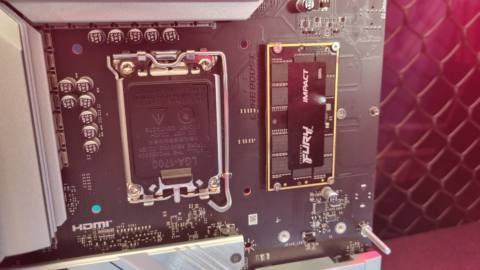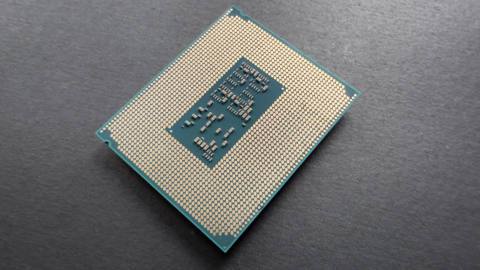We've seen a new memory form factor show up in a few places at Computex 2024—across modules to motherboards. Not least surprising is how often memory manufacturer Micron mentioned it to me at the show. And how enthused it was with the memory form factor, which it is first with to market.
“I think the future really lies here, which is LP[CAMM2] running on the PC using this form factor,” Dinesh Bahal, VP and GM of Micron's Consumer & Components Group, says.
LPCAMM2 is effectively a pancaked memory kit. It offers some similarities to soldered memory while still being able to be replaced by the user. For that reason, it's seen as the perfect fit for the next-generation of thinner laptops, and Crucial is the first out the door with its 32 GB and 64 GB kit.
“So people went from the SO-DIMM is taking too much space, let me just start soldering it down. The problem with soldering it down is that I'm deciding my configuration upfront.”
LPCAMM solves that problem pretty succinctly. And if costs end up being relatively reasonable for the modules when compared to SO-DIMM or soldered, then the user should benefit when buying a new laptop with LPCAMM2 installed.
Micron says it believes it can be competitive on pricing: one LPCAMM2 module replaces two SO-DIMMs, which halves the non-memory components required. It also expects it will reduce motherboard complexity, though that really depends on the motherboard manufacturer. One point that the company argues, and I'm not sure I personally agree with, is how even if it's more expensive, manufacturers can weigh that cost against the added value that AI brings to a PC and the customer.
I get the point, but I'm still waiting on the added value.
Current LPCAMM2 kits are quite expensive compared to standard SO-DIMM, but new technologies often are.
“Where we see LPDDR5X going, there is a lot more headroom here [LPCAMM2].”
“There are three things that AI is hungry for… bandwidth, capacity and power,” Praveen Vaidyanathan, from Micron's Computer Networking business unit, tells me.
Vaidyanathan suggests LPCAMM2 has bandwidth and capacity covered, considering it's easy to scale to higher capacities, naturally dual-channel, and runs faster than many DDR5 SO-DIMMs from the get-go. However, he argues that it's the power factor that is most crucial.
“60% lower power than equivalent DDR5… What are you going to start putting fans in every laptop right? Everybody's going fanless now. So power is going to be a big deal, which is why I think LP[CAMM2] will actually win over DDR5 in the next few years.”
“Our belief is you can always eke out performance you can always eke out capacity, power is going to be the differentiator.”
We've also seen CAMM2 crop up on the desktop, such as Kingston's latest at Computex. These kits come with DDR5 memory chips installed, in the place of LPDDR5X.


Catch up with Computex 2024: We're on the ground at Taiwan's biggest tech show to see what Nvidia, AMD, Intel, Asus, Gigabyte, MSI and more have to show.
That's an interesting use case. On the one hand, more efficient memory at high speeds would be effective, and the ability to more effectively cool the chips directly could lead to much more headroom. You could lump a cooler on top of CAMM2 much like you would a CPU. On the other, DIMMs are simple, easy-to-use, and gaming PC manufacturers don't often care much for efficiency.
More power, more performance—it's easy to see why the gaming market is the way it is compared to thin-and-light notebooks. However, with AMD now on the more efficient end of the scale with its desktop processors, and Intel likely looking at a more efficient design in Arrow Lake, I wonder if we will see more power efficiency products crop up in the near future.
Our gaming PCs will surely have to become more power savvy at some point soon—maybe CAMM2 could help?






